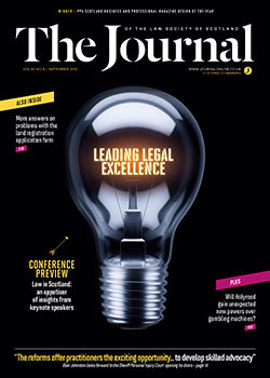President's column

As Heraclitus once mused, the only thing that is constant is change. That is certainly true of the rapidly evolving legal services market, both at home and abroad.
I recently had the privilege of representing the Scottish solicitor profession at the annual conference of the Canadian Bar Association. The impact of technology on the expectations and demands of clients was much discussed. One keynote speaker, Leonard Brody, a law graduate and internet entrepreneur, expressed the view that the digital era has come to an end and that we are now in the era of “The Great Rewrite”, a behavioural revolution, changing the way that everything is done, triggered by the internet. In his view, the role that artificial intelligence will play in the delivery of legal services will be dictated by our clients and, because of AI, business models will have to change. “What you need to understand is what the client wants.”
Consider then IBM Watson, a computing system that can read thousands of documents from multiple sources in seconds, interpret the data to expose patterns, connections and insights, and then use inputs from humans to learn how to interpret the information. For example, Watson for Oncology is a product designed to analyse a cancer patient’s medical information against a vast array of data and expertise to provide tailored evidence-based treatment options. The intention is that decisions can be made faster, more cost-effectively and with more confidence. IBM is now working with lawyers to develop Watson for use by the legal profession.
In the meantime, case management systems are becoming increasingly sophisticated and analytical tools are being developed, for example, to identify which personal injury cases win at court and whether or not someone has been unfairly dismissed. In a session on the use of AI, delegates pondered the ethical and regulatory issues arising from the use of, or failure to use, AI, and the risk of lawyers becoming de-skilled as a consequence of reliance on it. While this may all sound frightening, the likelihood is that early use of such tools will offer only short-term advantage because, as the cost of new technology rapidly reduces, the way in which everyone delivers legal services will change.
Changing landscape
Closer to home, in England & Wales, new entrant to the legal market Riverview Law is targeting the work of traditional law firms using bespoke technology and innovative client service models.
Client demands are certainly influencing the size and shape of the Scottish legal market today. In the commercial sector many corporate clients are reducing the size of their legal panels and demanding that panel firms have strength and depth in the sectors in which they operate. This is often one of the drivers for the consolidation and merger of commercial law firms. And in a world where client satisfaction is often assessed through internet sites such as TripAdvisor, how long will it be before solicitors become the subject of systematic public performance appraisal?
A response to the demand for specialist expertise can be seen in firms across Scotland – small and large – where niche practices in specialist areas are being developed with non-specialist work being referred on to other firms with appropriate expertise. Collaboration networks among city, high street and rural firms are on the rise.
It’s all in the conference
If your interest is piqued and you would like to learn more, then I encourage you to come along to our flagship annual conference, “The Law in Scotland – Leading Legal Excellence”, on 2 October 2015. There is a fascinating and varied programme of events including a keynote speech by Karl Chapman, the chief executive of Riverview Law, and sessions on disruptive technologies in the law, new business models, innovation, and collaboration networks. And that is just a taste of some of the fascinating sessions on offer, including keynote speeches from Lord Hodge, Professor Sir Jeffery Jowell and Rasmus Ankersen, and panel sessions on the gender pay gap, the rule of law in administrative justice and Brexit. I hope to see many of you there.
In this issue
- Good health – fair question?
- Time to raise the age of criminal responsibility
- Adoption of foreign children – a clash of cultures?
- Presumed liability: the case for action
- Le Bief Bovet: 700 years of litigation
- Reading for pleasure
- Opinion: James O'Reilly (fuller version)
- Opinion: James O'Reilly
- Book reviews
- Profile
- President's column
- Land Register completion update
- People on the move
- Conference calls
- A new court rises
- Questions of form
- Charities - why reserves matter
- Place your bets
- Pensions: a formula unravelled
- Whereabouts unknown?
- Lego Man keeps his mark
- The company one keeps
- Scottish Solicitors Discipline Tribunal
- Land, leases and LBTT
- Big budget brief
- Support sought as Napier joins the law clinics
- Public Guardian's fees to increase
- Law reform roundup
- TCPD: the Update way
- How are we doing?
- Thanks, but no thanks
- Ask Ash






